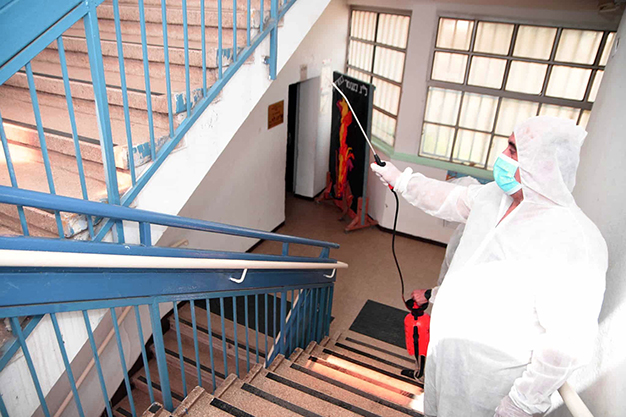Ensuring the safety of students in schools is paramount, and one often overlooked aspect of this responsibility is the cleanliness of the environment. Professional cleaners play a vital role in maintaining a safe and hygienic atmosphere within educational institutions. From preschools to universities, these unsung heroes work tirelessly behind the scenes to combat germs, allergens, and contaminants that can jeopardize the well-being of students and staff alike. In this blog post, we will delve into the indispensable role that professional cleaners play in safeguarding school environments. From disinfecting high-touch surfaces to ensuring proper ventilation, their expertise goes far beyond just tidying up. We’ll explore the specific tasks they undertake, the challenges they face, and the impact their work has on promoting a healthy learning environment. Join us as we shine a light on these often underappreciated individuals and recognize the crucial role they play in ensuring the safety and well-being of our students.
Beyond Cleanliness: How Professional Cleaners Contribute to Student Well-being

In the bustling corridors and busy classrooms of schools, cleanliness is often associated with aesthetics or basic hygiene. However, the role of professional cleaners extends far beyond just maintaining a tidy environment. In this article, we delve into the multifaceted ways in which professional cleaners contribute to the overall well-being of students. From fostering healthier spaces to promoting a conducive learning atmosphere, their impact goes beyond the surface.
Creating Healthy Environments
Professional cleaners are instrumental in creating and maintaining healthy environments within schools. By diligently sanitizing surfaces, disinfecting common areas, and combating allergens, they play a crucial role in reducing the spread of illnesses. A clean environment is not just visually pleasing; it also minimizes the risk of students falling sick, thereby ensuring they can attend classes regularly and focus on their studies without disruptions.
Supporting Physical Health
Cleanliness directly impacts physical health, and professional cleaners contribute significantly to this aspect. Their meticulous attention to detail in cleaning bathrooms, cafeterias, and other high-traffic areas helps prevent the transmission of harmful bacteria and viruses. By eliminating potential health hazards, such as mold or mildew, they create safer spaces where students can thrive without being exposed to allergens or respiratory irritants.
Enhancing Mental Well-being
A clean and organized environment can have a profound effect on students’ mental well-being. Professional cleaners ensure that classrooms and common areas are clutter-free and conducive to learning. A tidy space promotes focus and concentration, reduces stress levels, and creates a sense of orderliness that can positively impact students’ overall mood and mental health.
Promoting a Positive Learning Environment
The ambiance of a school greatly influences students’ attitudes towards learning. Professional cleaners contribute to fostering a positive learning environment by maintaining cleanliness throughout the premises. When students walk into a school that is clean and well-maintained, they feel respected and valued, which can boost their morale and enthusiasm for learning.
Preventing Allergic Reactions
Allergens like dust, pollen, and pet dander can trigger allergic reactions in susceptible individuals, affecting their ability to concentrate and participate fully in school activities. Professional cleaners employ techniques to minimize allergen buildup, such as regular dusting, vacuuming with HEPA filters, and using hypoallergenic cleaning products. By creating an environment free of allergens, they ensure that all students can enjoy a comfortable and symptom-free learning experience.
Safety Starts with Cleanliness: Professional Cleaners and the Importance of Preventative Measures
In the realm of school safety, the spotlight often falls on security measures, emergency protocols, and infrastructure improvements. However, one critical aspect that frequently goes underappreciated is the role of professional cleaners. These unsung heroes work tirelessly behind the scenes, implementing rigorous cleaning protocols and preventive measures to ensure that schools remain safe, healthy environments for students, teachers, and staff. In this article, we will explore why safety truly starts with cleanliness and how professional cleaners play a pivotal role in implementing preventative measures to safeguard school communities.
Reducing the Risk of Illness Outbreaks
One of the primary objectives of preventative cleaning measures is to reduce the risk of illness outbreaks within school environments. By targeting common sources of germs and viruses, such as doorknobs, desks, and restroom facilities, professional cleaners can help minimize the spread of contagious diseases like colds, flu, and norovirus, thereby protecting the health of everyone on campus.
Creating a Clean and Inviting Learning Environment
A clean and well-maintained school environment is not only conducive to learning but also fosters a sense of pride and ownership among students and staff. Professional cleaners play a vital role in creating this atmosphere by ensuring that classrooms, hallways, and common areas are free from clutter, debris, and unsanitary conditions, promoting a positive educational experience for all.
Addressing Indoor Air Quality
Indoor air quality can significantly impact the health and well-being of individuals within a school setting. Poor air quality can exacerbate respiratory issues, trigger allergies, and contribute to overall discomfort. Through the use of advanced air filtration systems and regular HVAC maintenance, professional cleaners help improve indoor air quality, creating a healthier environment for breathing and concentration.
Preventing Slip, Trip, and Fall Incidents
In addition to addressing hygiene concerns, preventative cleaning measures also encompass maintaining a safe physical environment to prevent accidents and injuries. Professional cleaners play a crucial role in this aspect by promptly addressing spills, removing obstacles from walkways, and ensuring that floors are clean and free from hazards, thus reducing the risk of slip, trip, and fall incidents.
Mitigating Pest Infestations
Pest infestations can pose serious health risks and disrupt the learning environment. Professional cleaners are trained to identify and address potential pest harborage areas, such as food waste bins, cracks in walls, and moisture-prone areas. By implementing proactive pest control measures, they help mitigate the risk of infestations and maintain a pest-free environment conducive to learning.
Guardians of Health: Professional Cleaners and the Fight Against Germs
Professional cleaners are the unsung heroes in the ongoing battle against germs within school environments. Their meticulous work goes beyond surface cleaning, targeting common pathogens to create safe and healthy spaces for students and staff. In this article, we’ll explore the crucial role that professional cleaners play as guardians of health in the fight against germs.
- Vigilant Germ Control: Professional cleaners employ rigorous protocols to combat germs, targeting high-touch surfaces and common areas where pathogens thrive.
- Preventing Illness Outbreaks: By reducing the spread of contagious diseases like colds and flu, professional cleaners help minimize absenteeism and maintain a productive learning environment.
- Enhancing Indoor Air Quality: Advanced cleaning techniques and air purification systems contribute to improved indoor air quality, promoting respiratory health and overall well-being.
- Mitigating Health Hazards: Proactive measures such as pest control and sanitation practices help mitigate health hazards, ensuring a safe and hygienic school environment.
Conclusion
At Clean Group in Sydney, we understand the critical role that professional cleaners play in maintaining school safety. Through our meticulous cleaning protocols and dedicated team, we prioritize the health and well-being of students, teachers, and staff alike. By upholding stringent cleanliness standards, we contribute to creating a safe and hygienic environment conducive to learning. Our commitment to excellence underscores our belief that a clean school is a safer school, fostering a conducive atmosphere for academic success and overall community well-being.

